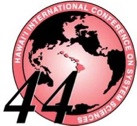Social Networking and Government Minitrack

Co-chairs
Jay Kesan (Primary Contact)
College of Law
University of Illinois at Urbana Champaign
504 E. Pennsylvania Ave. Champaign, Ill 61820, USA
Phone +1-217-333-7887
Email: kesan@uiuc.edu
Suha AlAwadhi
Department of Library & Information Science
College of Social Sciences
Kuwait University
P.O. Box 68168, Kaifan 71962, Kuwait
Phone: +965-2-498-4845
Fax: +965-2-484-0718
E-mail: s.alawadhi@ku.edu.kw
Peter Parycek
Donau-Universität Krems
Department Governance & Public Administration
Zentrum für E-Government
Trakt H, 2nd floor, room 2.42
Dr.-Karl-Dorrek-Straße 30
A-3500 Krems, Austria
Phone: +43-2732 893-2312
Fax: +43-2732 893-4300
E-Mail: peter.parycek@donau-uni.ac.at




Social Networks have received a lot of attention in the last decade. Sites such as MySpace, Facebook, Twitter, and LinkedIn provide a mechanism for individuals to come together based on a variety of factors such as existing friendships, common interests, or work. People have discovered how the use of social networks can facilitate communication and the exchange/sharing of thoughts and ideas. Governments have also discovered the potential for these sites to aid in government information sharing and outreach. At the same time, issues surrounding privacy, information leakage, blurred boundaries, and online addiction must be addressed when discussing social networks.
This minitrack is open to papers that cover all aspects of social networking, especially as they relate to electronic government.
Topics and research areas include, but are not limited to:
-
•Case studies of the use of social networks by any level of government
-
•Implementation challenges
-
•Maintaining privacy in social networks
-
•Patterns and trends in social networking
-
•Social networks as a means to conduct information sharing
-
•Leakage of organizational information through social networks
-
•Trust and information credibility in social networks
-
•Social Networks and ‘information overload’
-
•Mobile social networking
More co-chair information
Jay P. Kesan, PhD, is Professor & Mildred Van Voorhis Jones Faculty Scholar and Director of the Program in Intellectual Property & Technology Law at the University of Illinois. His academic interests and writings are in the areas of digital government, cyberlaw, patent law, entrepreneurship, and law and technology. He is Group Leader of the Business, Economics & Law of Genomic Biology (BioBEL) research theme at the Institute of Genomic Biology. He is a registered patent attorney and received his J.D. summa cum laude from Georgetown University. He also has a Ph.D. in Electrical and Computer Engineering from the University of Texas at Austin and worked for several years as a research scientist at the IBM T.J. Watson Research Center in New York. For a more complete bio, please see http://www.jaykesan.com
Suha AlAwadhi, PhD, is Acting Head, Department of Library and Information Science in College of Social Sciences at Kuwait University in Kuwait. She received her Ph.D. in Information Science from Loughborough University. She is a member of DGSNA and a member of the program committee for IFIP E-government Conference (EGOV) 2010. Dr. AlAwadhi has participated in many conferences such as HICSS, EGOV, IFLA. Her research areas of interest include e-government, knowledge management, social inclusion and knowledge sharing.
Peter Parycek, PhD, MSc, is Head of the Center for E-Government at the Danube University Krems and Chairman of the ministerial working groups “E-Democracy & E-participation” and “E-Government Training” at the Austrian Federal Chancellery. As a lawyer and graduate of the Master's program Telematics, his work is at the intersection of legal policy, social and technological developments. His research and project priorities include eGovernance, eDemocracy and eGovernment.

“Social media provide a new dimension to the interactions between citizens and government ”






